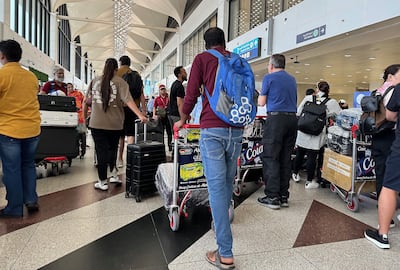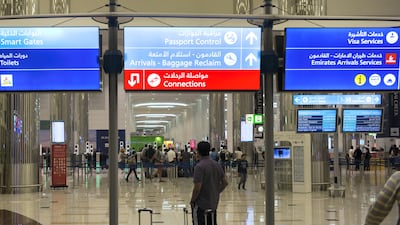Dubai airport authorities have toughened up on rules that require visitors to have a return ticket and a minimum amount of money for their stay.
Immigration officials are, in some cases, asking for proof that passengers have at least Dh3,000 in cash or credit and a return ticket home.
The rules, which are not new, are to ensure people are not using the tourist visa system to stay beyond 30 or 60 days, for example, and to catch out jobseekers that have no intention of leaving.
The General Directorate of Residency and Foreigners Affairs (GDRFA) has not commented on the recent checks, but travel agents and passengers said authorities have asked travellers in some cases.
India-based travel agent
UAE immigration rules state that visitors should also be able to provide a hotel booking or the address of a relative, though they are often only asked if immigration officials are suspicious.
Afi Ahammad, a travel agent in India who services the UAE market, said the rules are clear.
"They must carry Dh3,000 to Dh5,000 in cash or have a credit or debit card to show enough balance to fund their stay, a return flight ticket, and a proof of residence," he said.
"If they are staying with a relative, then they need to show proof of their residence and [their relative's] Emirates ID.
Airlines in Kerala have, in some cases, prevented passengers from boarding because they cannot show they sufficient funds or lack documents.
A number of passengers who have arrived at Dubai airport recently told The National they were unable to meet the requirements and had to stay in the terminal until they could fly home.
"Often they are first-time travellers and are unable to speak the language and convince officials even though they have all the documents," Mr Ahammad said.
"The rules are very clear, and if the travellers have all the documents then there should be no problem.
"So many travellers enter the UAE on the same visa without any trouble every day."

Passengers held in halls
First time visitor Aju, who did not give a surname, flew with carrier Spicejet to Dubai. He was held up at Dubai airport when he was unable to show he had Dh3,000 in his bank account.
“I was allowed to board the flight at Kochi airport after the airline staff checked if I had the contact number of my relative in Dubai and a copy of their Emirates ID,” said Aju, a resident of the south Indian city of Kannur.
"But, they didn't ask me about the funds."
He said he had to stay at Dubai airport for six days before flying back.
Another traveller, who would not give their name, was held up by officials when he arrived and was unable to show he had Dh3,000 with him.
"I've been to the UAE before and was carrying my return ticket and a copy of the visit visa with me," he said.
He was later moved to a waiting hall with other passengers who had also not met the entry criteria.
"I understand that the UAE has the right to outline their visa rules but airlines and travel agents are equally responsible to keep us up-to-date," he said.
He was at Dubai airport for seven days before being able to return home. While some travellers were sent back, UAE immigration officials did allow those who were able to sort out the documentation correctly to enter the country, passengers said.
The UAE’s immigration laws states that those entering on a visit visa must be in the country for tourism purposes only, and not to look for employment.
A special visa for jobseekers was introduced in 2022. The UAE 60-day, multi-entry jobseeker’s visa is to help attract young talent and skilled professionals find employment in the country.
It requires a sponsor or a host, and a different set of documents.

